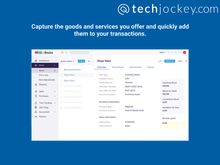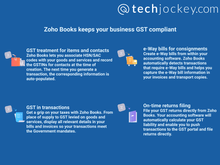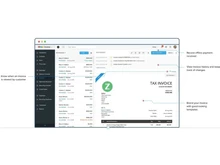Zoho Invoice and Zoho Books are two prominent players in the field of billing and invoicing. Both platforms share a common goal of streamlining financial operations, and despite that they cater to different aspects of financial management.
Zoho Invoice focuses on invoicing and billing, thereby making it an ideal choice for small businesses and freelancers looking for a simple way to manage client invoicing. Zoho Books, on the other hand, is an extensive accounting platform designed to handle the complete accounting needs of growing businesses.
While Zoho Invoice excels in simplifying invoicing processes, Zoho Books is more suited for businesses seeking an all-in-one accounting solution with more extensive financial management capabilities.
Zoho Invoice vs. Zoho Books: Overview
Zoho Invoice is a powerful and user-friendly online invoicing tool designed for freelancers and small businesses. It helps in simplifying the billing process by allowing users to create, send, and track invoices, manage client payments, and automate recurring billing.
On the other hand, Zoho Books accounting software that goes beyond invoicing. It covers a wide range of financial management tools, including bookkeeping, expense tracking, inventory management, and tax compliance. Between Zoho Invoice and Zoho Books, Zoho Invoice stands out for its simplicity and focus on invoicing, while Zoho Books is preferred by businesses that require an extensive solution for managing their vast financial ecosystem.
Zoho Invoice vs. Zoho Books: Pros & Cons
- Zoho Invoice offers limited accounting functionalities. However, Zoho Books is a full-fledged accounting solution that consists of several advanced features including inventory management, bank reconciliation, and more.
- Compared to Zoho Invoice, Zoho Books comes with a subscription fee, and this can be a major roadblock for the users who have a limited budget.
- While Zoho Invoice offers limited reporting functionalities to the users, Zoho Books on the other hand, provides detailed financial reports including profit and loss statements, balance sheets, and cash flow reports.
- Zoho Invoice does not support multiple currencies, due to which the users cannot use the platform for global business. On the contrary, Zoho Books can handle transactions in multiple currencies, making it an ideal choice for businesses with global operations.
Zoho Invoice vs. Zoho Books: In Terms of Features
- Invoicing Capabilities: Zoho Invoice specializes in creating professional invoices quickly and easily, while Zoho Books offers the same capabilities but with added features such as multi-currency invoicing, recurring payments, and more detailed invoice tracking.
- Accounting: Zoho Invoice offers basic invoicing and payment tracking but does not include the advanced accounting features found in Zoho Books. Zoho Books includes tools for bank reconciliation, expense tracking, and comprehensive accounting reports.
- Tax Compliance: Zoho Books excels in tax management, with built-in features for handling GST, VAT, and other taxes, while Zoho Invoice requires external solutions for tax compliance.
- Inventory Management: Zoho Books includes inventory tracking and management, which is not available in Zoho Invoice.
Zoho Invoice vs. Zoho Books: Ease of Use
When it comes to ease of use, Zoho Invoice excels as more user-friendly for small businesses and freelancers. Its interface is simple, streamlined, and highly intuitive, making it easy to get started with basic invoicing needs. On the other hand, Zoho Books, comes with a slightly steeper learning curve due to its broader set of accounting features. Users who need full accounting solutions might find Zoho Books more complex to navigate initially.
Zoho Invoice vs. Zoho Books: Scope of Use
Zoho Invoice is ideal for businesses focusing on invoicing and payment tracking, making it suitable for freelancers and small businesses with straightforward needs. Meanwhile, Zoho Books caters to businesses that require a full-fledged accounting solution, including inventory management, banking, and financial reporting. Zoho Books is designed for companies looking for complete financial management beyond just invoicing.
Zoho Invoice vs. Zoho Books: Learning Curve
Zoho Invoice has a gentle learning curve, making it ideal for users who need a quick and easy solution to manage invoicing. It requires minimal training and offers a straightforward experience. On the other hand, Zoho Books requires more time to learn due to its comprehensive features, but once mastered, it provides a robust solution for managing all aspects of a business's finances.
Which is Better, Zoho Invoice or Zoho Books?
Zoho Invoice outshines Zoho Books in various critical areas, making it a favorable choice for many businesses focused solely on invoicing. First and foremost, Zoho Invoice offers a streamlined and simple interface, which makes it easy for users to manage and track invoices without diving into complex accounting tasks. Additionally, Zoho Invoice provides tailored tools specifically designed for invoicing, making it a perfect fit for freelancers and small businesses that require a straightforward solution.
However, Zoho Books shines when it comes to comprehensive accounting management. Zoho Books offers full-fledged accounting features, including expense tracking, bank reconciliation, and financial reporting, which are necessary for growing businesses that need more than just invoicing. For businesses requiring detailed financial management, Zoho Books provides the depth and performance needed to handle complex financial data effectively.


 58 Ratings & 58 Reviews
58 Ratings & 58 Reviews

































